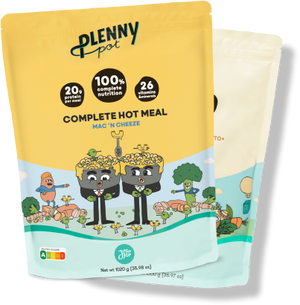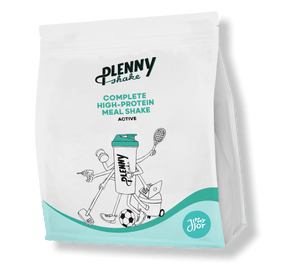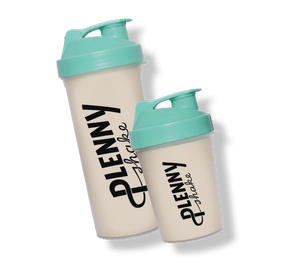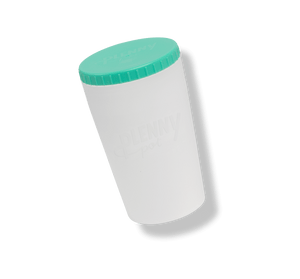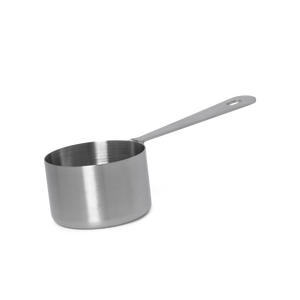The Plenny Drink requires no preparation, you only need to shake it before drinking, and enjoy, it is as simple as that! Let’s discover what is inside the Plenny Drink and what the Plenny Drinks can do for you.
PLEASE NOTE: v1 is an old formula. We're now on Plenny Drink v2.
|
Nutrition |
Value |
RDA (%) |
|
Energy |
400 kcal / 1681 kJ |
20% |
|
Fat |
14,4 gram |
21% |
|
From which saturated fats |
1,0 gram |
5% |
|
Carbohydrate |
53 gram |
20% |
|
From which sugar |
6,9 gram |
8% |
|
Fibers |
5,9 gram |
|
|
Protein |
12 gram |
24% |
|
Salt |
0,50 gram |
|
Ingredients
- Water
- Maltodextrin
- Rapeseed oil
- Soy protein concentrate
- Oats (3%)
- Oat fiber
- Emulsifier: soy lecithin
- Acidity regulator: citric acid
- Vitamin and mineral blend (potassium citrate, potassium chloride, sodium fluoride, ferrous lactate, zinc sulphate, sodium selenite, manganese sulphate, chromium(III)chloride, cupric gluconate, potassium iodide, sodium molybdate, vitamin C, vitamin E, vitamin A, niacin, biotin, vitamin D, folic acid, vitamin B6, vitamin B1, riboflavin, vitamin K, vitamin B12, pantothenic acid, calcium hydroxide, magnesium hydroxide, disodium phosphate, dipotassium phosphate, tricalcium phosphate),
- Flavoring
- Ground vanilla beans
- Thickener: microcrystalline Cellulose, carboxymethylcellulose, guar gum
- Sweetener: sucralose
Proteins
Plenny Drink provides you the correct amino acid ratio. The World Health Organization has advised an intake of 0.66 gr of protein per kg bodyweight. If you drink five Plenny Drinks per day, you would consume 60 grams of protein, more than enough to provide to an average 80 kg weighing person his daily protein need. [1]. Proteins are the building blocks of your cells, for example, they are needed for growth and muscle protection. No wonder why we add them!
The main source of protein in the Plenny Drink comes from soy protein, which we added it in the exact amount your body needs to work properly. [1] This is the amino acid profile in a bottle of Plenny Drink:
|
Amino acid |
mg per bottle |
|
Histidine Isoleucine Leucine Lysine Methionine and cysteine Phenylalanine and tyrosine Threonine Tryptophan Valine |
0920 mg 1471 mg 2803 mg 2365 mg 1040 mg 2919 mg 1472 mg 0492 mg 1617 mg |
Fats
The oats and soy provide a bit of fat, but the main source of fats in the Plenny Drink comes from the rapeseed oil we add. Why rapeseed oil? Well, this particular oil provides a lot of nice polyunsaturated fats (PUFAs), just a little bit of saturated fats and a great amount of omega 3 and 6, the heart-friendly stuff your body loves. If you listen carefully while drinking Plenny Drink, you can hear your body moan softly from excitement. The World Health Organization has advised getting around 20 to 35% percent of your energy from fats. In our Plenny Drink 33% of the energy comes from fats [2]. But do not be scared of fats, we add them in the right amount! Fats are one of your body's preferred energy sources to rock throughout the day, also, they play important roles in your body, such as maintaining hormone balance or a proper brain functioning.
So how much omega fatty acids are present in a bottle of Plenny Drink?
|
Fatty acid |
g per bottle |
percentage of total energy |
|
Alpha-linolenic acid (omega 3) Linolenic acid (omega 6) |
0.8 g 2.2 g |
2.8% 8.1% |
The amounts of omega 3 and 6 are based on the advice of the World Health Organization. The WHO stated: “The minimum intake values for essential fatty acids to prevent deficiency symptoms are estimated at a convincing level to be 2.5%E LA plus 0.5%E ALA.” [2] So yeah, we made sure we could cover those omega amounts pretty nicely.
The fatty acid profile is based on a 2008 report from the World Health Organization: Fats and fatty acids in human nutrition. The report recommends from 6 to 11% of the total energy intake to be from polyunsaturated fats, called PUFAs, and 15 to 20% to be from monounsaturated fats, called MUFAs. In Plenny Drink, 11% of the energy intake comes from PUFAs and 19% from MUFAs. [2]
Carbohydrates
For a sufficient amount of energy, we use maltodextrin derived from wheat. The World Health Organization states: “The consultation recommends an optimum diet of at least 55% of total energy from a variety of carbohydrate sources for all ages except for children under the age of two.” Therefore, we came up with a formulation from which 53% of the total energy is provided from carbohydrates. Carbohydrates are the main source of energy for your brain and they help in maintaining the proper levels of glucose in your body.
So why maltodextrin? It’s an ingredient we use for energy purposes. It provides only glucose molecules, which the mitochondria in your body needs to make energy. Maltodextrin is an essential ingredient to fuel a good working body since it is easily absorbable. Nevertheless, the Glycemic Index (GI) won’t hit the ceiling, since we complement this amount of energy with proteins and fats [5]. This makes the GI not go buck wild, keeping you balanced instead of making you want to take a 14-hour nap after lunch.
And what about the sugar content? The WHO has strongly recommended to get less than 10% of your energy from sugars in a report from 2015. [7] If you would solely drink Plenny Drinks you would get 7% of your energy from sugars.
Fibers
We also added some extra fibers to the Plenny Drink. One bottle contains 5.9 grams of fibers, so when you drink five Plenny Drinks a day, you will get 29.5 grams of fibers. We set this amount based on a few authorities’ recommendations. The Dutch Authority, for instance, advises 30 to 40 grams of fibers a day [4], and the American Heart Association Eating Plan suggests a daily intake of 25 grams of fiber in a 2,000 calorie diet. Another box checked! ☑
Micronutrients
Next, to all the macronutrients, we also looked after the little guys and did not forgot about the micronutrients in the Plenny Drink. We added all the necessary vitamins and minerals to provide the recommended daily intakes established in the European Regulation 1169. [6] Every Plenny Drink bottle contains 20% of your daily needs of micronutrients. We added them because they are quite important for you, they play an important role in your body in cellular functions, neurotransmission, fluid balance or tissue structure, among others [8].
What else? Right! The flavoring. Our Plenny Drink is vanilla flavored. We added real ground vanilla seeds and a vanilla aroma to make it taste ridiculously nice. We hope you will enjoy it as much as we do.
Order Plenny Drink
Sources
- The World Health Organization, & United Nations University. (2007). Protein and amino acid requirements in human nutrition (Vol. 935). The World Health Organization.
- The World Health Organization, & United Nations University. (2008). Fats and fatty acids in human nutrition . The World Health Organization.
- The World Health Organization, & United Nations University. (1998). Carbohydrates. The World Health Organization.
- Health Council of the Netherlands. Guideline for dietary fiber intake. The Hague: Health Council of the Netherlands, 2006; publication no. 2006/03E.
- Elham Moghaddam, Janet A. Vogt, Thomas M. S. Wolever, The Effects of Fat and Protein on Glycemic Responses in Nondiabetic Humans Vary with Waist Circumference, Fasting Plasma Insulin, and Dietary Fiber Intake, The Journal of Nutrition, Volume 136, Issue 10, October 2006, Pages 2506–2511,
- EU. (2011). on the provision of food information to consumers. European Parliament, Council of the European Union.
- World Health Organization. (2015). Guideline: sugars intake for adults and children. World Health Organization.
- Shergill-Bonner, R., Micronutrients. Paediatrics and Child Health, 2017. 27(8): p. 357-362.






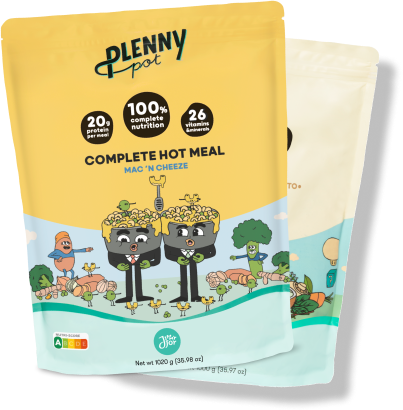

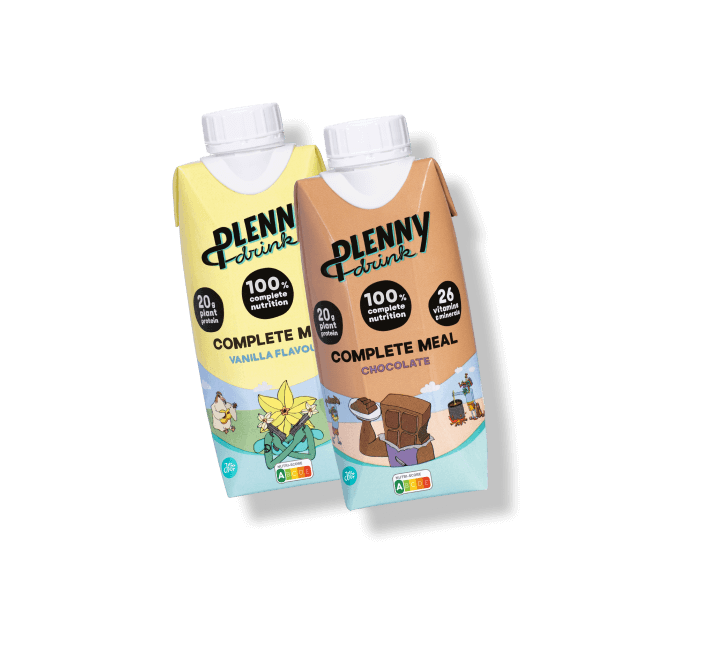





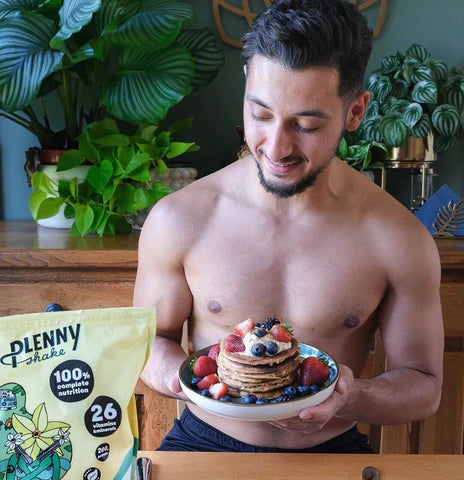



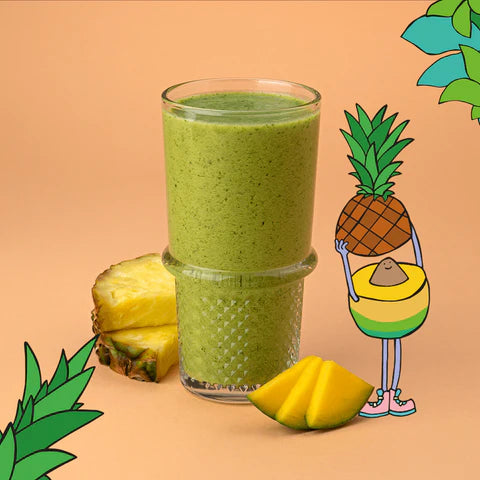


 Product added to cart
Product added to cart



